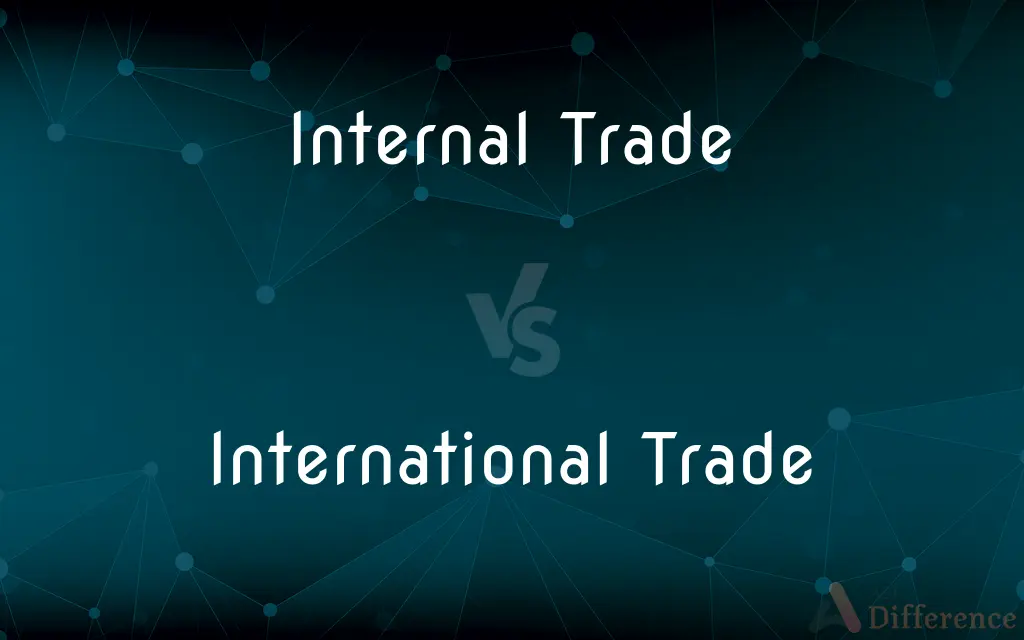Internal Trade vs. International Trade — What's the Difference?
Edited by Tayyaba Rehman — By Fiza Rafique — Published on December 7, 2023
Internal Trade is the exchange of goods and services within a single country. International Trade involves exchanges between different countries.

Difference Between Internal Trade and International Trade
Table of Contents
ADVERTISEMENT
Key Differences
Internal Trade refers to the buying and selling of goods and services within the boundaries of a single country. It's governed by the national regulations and laws of that particular country. International Trade, on the other hand, encompasses the trade of goods and services between two or more countries, adhering to international laws and treaties.
Internal Trade typically deals with a homogenous regulatory and economic environment since it occurs within one country. Factors like currency, culture, and business practices remain consistent. International Trade, conversely, navigates diverse currencies, cultures, legal systems, and business conventions, making it more complex.
While Internal Trade is unaffected by international relations and global events, International Trade is directly influenced by diplomatic relations, international conflicts, and global economic events. Trade barriers and tariffs are common challenges in international trading.
Internal Trade doesn't face challenges related to customs, import-export duties, or international shipping logistics. All goods and services move freely within the country. In contrast, International Trade involves customs procedures, trade duties, and intricate logistics due to crossing national borders.
Language and communication barriers are typically non-existent in Internal Trade due to a shared national language. International Trade, however, often requires multilingual communication and understanding of cultural nuances, particularly in negotiations and contract discussions.
ADVERTISEMENT
Comparison Chart
Geographical Scope
Within a single country.
Between two or more countries.
Regulatory Environment
Governed by national laws.
Governed by international laws and treaties.
Currency Used
Single national currency.
Multiple currencies.
Trade Barriers
Typically none.
Tariffs, quotas, and other trade barriers.
Cultural & Language Barriers
Minimal, due to shared culture and language.
Often present, requiring cultural and language adaptations.
Compare with Definitions
Internal Trade
The buying and selling occurring within a single nation.
New York's fashion sector is a pivotal part of American Internal Trade.
International Trade
Business activities adhering to global treaties and conventions.
Despite its challenges, International Trade offers businesses access to new markets.
Internal Trade
Trade activities governed by national laws and regulations.
Florida's tourism industry plays a crucial role in its Internal Trade.
International Trade
Commerce that crosses national boundaries.
Advancements in shipping have facilitated International Trade immensely.
Internal Trade
Economic transactions without crossing international borders.
The rise of e-commerce has boosted Internal Trade across the US.
International Trade
The exchange of goods and services between countries.
The US has a rich history of International Trade with Europe.
Internal Trade
The exchange of goods and services within a country.
The Internal Trade in Texas is booming due to its diverse industries.
International Trade
Economic transactions involving two or more nations.
The NAFTA agreement streamlined International Trade among its member countries.
Internal Trade
Commerce conducted within national boundaries.
California's wine industry significantly contributes to its Internal Trade.
International Trade
Trade governed by international laws, treaties, and agreements.
China and the US are significant players in the realm of International Trade.
Common Curiosities
How does International Trade differ from Internal Trade?
International Trade concerns the exchange of goods and services between different countries, whereas Internal Trade is restricted to one country.
Does International Trade require knowledge of multiple currencies?
Yes, International Trade often involves transactions in multiple currencies.
Are there customs duties in Internal Trade?
No, Internal Trade does not involve customs duties since it's within a single country.
Why is International Trade more complex than Internal Trade?
International Trade faces challenges like differing regulations, currencies, languages, and customs procedures.
Can national events influence Internal Trade?
Yes, national policies, laws, and economic events can significantly impact Internal Trade.
What does Internal Trade mainly involve?
Internal Trade involves the exchange of goods and services within a single country.
Are global events a concern for International Trade?
Yes, global events, diplomatic relations, and international conflicts can influence International Trade.
Does Internal Trade involve language barriers?
Typically, no, as Internal Trade is conducted within a country with a shared language.
How does culture impact Internal Trade?
In Internal Trade, cultural differences are typically minimal due to a shared national identity.
What role do treaties play in International Trade?
Treaties can simplify International Trade by establishing trade terms between countries.
How do tariffs impact International Trade?
Tariffs can increase the cost of imports or exports, influencing trade dynamics between countries.
Does Internal Trade require knowledge of international laws?
No, Internal Trade is governed by the national laws of a country.
What's a major advantage of International Trade?
International Trade allows countries to access goods, services, and markets not available domestically.
Can geopolitics affect both Internal and International Trade?
While geopolitics directly influences International Trade, it can also indirectly impact Internal Trade due to national reactions to global events.
Can a country survive solely on Internal Trade?
While theoretically possible, most countries benefit economically from engaging in International Trade.
Share Your Discovery

Previous Comparison
Montana vs. Wyoming
Next Comparison
Ferrous Fumarate vs. Ferrous SulfateAuthor Spotlight
Written by
Fiza RafiqueFiza Rafique is a skilled content writer at AskDifference.com, where she meticulously refines and enhances written pieces. Drawing from her vast editorial expertise, Fiza ensures clarity, accuracy, and precision in every article. Passionate about language, she continually seeks to elevate the quality of content for readers worldwide.
Edited by
Tayyaba RehmanTayyaba Rehman is a distinguished writer, currently serving as a primary contributor to askdifference.com. As a researcher in semantics and etymology, Tayyaba's passion for the complexity of languages and their distinctions has found a perfect home on the platform. Tayyaba delves into the intricacies of language, distinguishing between commonly confused words and phrases, thereby providing clarity for readers worldwide.












































